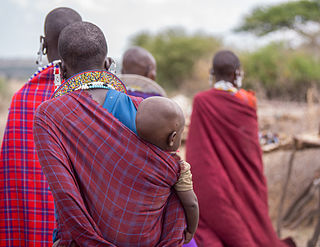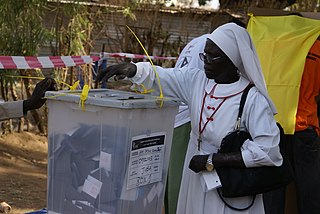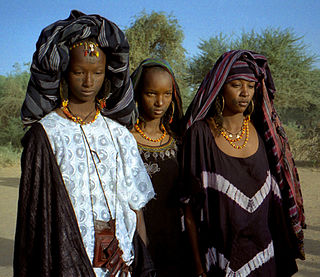Related Research Articles

Marriage, also called matrimony or wedlock, is a culturally and often legally recognized union between people called spouses. It establishes rights and obligations between them, as well as between them and their children, and between them and their in-laws. It is nearly a cultural universal, but the definition of marriage varies between cultures and religions, and over time. Marriage becomes a social construct to adjudicate the conflicts of interest between consenting individuals and a transactional means to fulfill their needs. Typically, it is an institution in which interpersonal relationships, usually sexual, are acknowledged or sanctioned. In some cultures, marriage is recommended or considered to be compulsory before pursuing sexual activity. A marriage ceremony is called a wedding, while a private marriage is sometimes called an elopement.
Marriageable age is the general age, a legal age or the minimum age subject to parental, religious or other forms of social approval, at which a person is legitimately allowed for marriage. Age and other prerequisites to marriage vary between jurisdictions, but in the vast majority of jurisdictions, the marriage age as a right is set at the age of majority. Nevertheless, most jurisdictions allow marriage at a younger age with parental or judicial approval, especially if the female is pregnant. Among most indigenous cultures, people marry at fifteen, the age of sexual maturity for both the male and the female. In industrialized cultures, the age of marriage is most commonly 18 years old, but there are variations, and the marriageable age should not be confused with the age of majority or the age of consent, though they may be the same.
Child marriage is a marriage or domestic partnership, formal or informal, between a child and an adult, or between a child and another child.
The African Charter on the Rights and Welfare of the Child was adopted by the Organisation of African Unity (OAU) in 1990 and was entered into force in 1999. Like the United Nations Convention on the Rights of the Child (CRC), the Children's Charter is a comprehensive instrument that sets out rights and defines universal principles and norms for the status of children. The ACRWC and the CRC are the only international and regional human rights treaties that cover the whole spectrum of civil, political, economic, social and cultural rights.

The age of consent in Africa for sexual activity varies by jurisdiction across the continent, codified in laws which may also stipulate the specific activities that are permitted or the gender of participants for different ages. Other variables may exist, such as close-in-age exemptions.

Women in the Democratic Republic of the Congo have not attained a position of full equality with men, with their struggle continuing to this day. Although the Mobutu regime paid lip service to the important role of women in society, and although women enjoy some legal rights, custom and legal constraints still limit their opportunities.

The status and social roles of women in Mali have been formed by the complex interplay of a variety of traditions in ethnic communities, the rise and fall of the great Sahelien states, French colonial rule, independence, urbanisation, and postcolonial conflict and progress. Forming just less than half Mali's population, Malian women have sometimes been the center of matrilineal societies, but have always been crucial to the economic and social structure of this largely rural, agricultural society.

Human rights in South Sudan are a contentious issue, owing at least in part to the country's violent history.
According to UNICEF, child marriage is the "formal marriage or informal union before age 18", and it affects more girls than boys. In Afghanistan, up to 57% of girls are married before they are 19. The most common ages for girls to get married are 15 and 16. Factors such as gender dynamics, family structure, cultural, political, and economic perceptions/ideologies all play a role in determining if a girl is married at a young age.

Child marriage in India, according to the Indian law, is a marriage where the woman and man both are younger than 21 years of age respectively. Most child marriages involve women, many of whom are poor socio-economic conditions.

Women in Chad, a landlocked country in Central Africa, are the mainstay of its predominantly rural-based economy and they outnumber the men. Chad is a country with diverse and rich cultural practices, such as male beauty pageants and long-kept-secret hair products. Despite their numbers in the general population, there are very few women in governmental positions and gender equality is far from being a reality in Chad. Chad is rated by the World Bank as the third least gender equal country in Africa. Additionally, there are few women who attain higher education, and many who receive a college degree do so outside of the country.

Roles, livelihoods, and the safety of women in Tanzania have improved significantly since the 20th century, made evident by the seating of Samia Suluhu Hassan - their first female President. Though throwbacks to a once strongly patriarchal society remain, modernised locals - like Dar es Salaam and Arusha - tell a story of upward mobility. Long-term visitors, from more liberal territories, will notice a surprising number of female business owners, middle managers and even security guards. Relatively high rates of gendered violence, as well as barriers to full legal rights and education, leave a lot of room for improvement but it can no longer be said that these issues characterise the average woman's experience in Tanzania.

Women in South Sudan are women who live in and are from South Sudan. Since the Independence of South Sudan on 9 July 2011, these women have gained more power but still face issues of inequality. Many women in this area do not have adequate access to health resources and education. While these women often face inequality, there has been progress since South Sudan's official declaration of independence. In recent years, this inequality has gained national attention and people have become more interested in the issue of child marriage that this area faces. Along with this, there has started to be a focus on the very high level of maternal mortality in South Sudan. With a maternal mortality rate of 789 deaths per 100,000 live births, South Sudan has one of the highest rates in the world.

Women in Niger are women that are from or live in the West African country of Niger. These women belong to a population in which 98% are practitioners of Islam. Laws adopted by the government of Niger to protect the rights of Nigerien women are most often based on Muslim beliefs.
The Islamic Republic of Iran signed the UN Convention on the Rights of the Child (CRC) in 1991 and ratified it in 1994. Upon ratification, Iran made the following reservation: "If the text of the Convention is or becomes incompatible with the domestic laws and Islamic standards at any time or in any case, the Government of the Islamic Republic shall not abide by it."
In the United States, child marriage in which at least one party is under 18 years of age—or the age of majority—in the U.S.

Child marriage is a marriage or union between a child under the age of 18 to another child or to an adult. Child marriage is common in a multitude of African countries. In South Sudan, child marriage is a growing epidemic. Child marriage in South Sudan is driven by socioeconomic factors such as poverty and gender inequality. Current figures state that South Sudan is one of the leading countries in the world when it comes to child marriage. Child marriage has negative consequences for children, including health problems and lower education rates for South Sudanese girls. Many initiatives have been taken to combat child marriage in South Sudan, but the presence of societal norms and instability continues to drive its presence in the nation.
Child marriage in the Democratic Republic of the Congo is the eighteenth highest in the world. In a child marriage, one or both parties are under the age of eighteen years old. In the Democratic Republic of the Congo (DRC), 37% of girls are married before they turn eighteen, and 10% of girls are married before age fifteen. Though significantly less than the rate of child marriage for girls, 6% of boys in the DRC are married before age eighteen.
Child marriage is the betrothal of girls and boys below the age of 18.
UNICEF's Early Marriage: A Harmful Traditional Practice report characterizes child marriage as a harmful institution that often exposes young women in developing nations to damaging domestic, health, and sexual conditions. The report also highlights the practice as a human rights violation. In World Vision's "Before She's Ready: 15 Places Girls Marry by 15", the organization highlights the socioeconomic consequences of child marriage on girls, noting that many girls are forced to stop their schooling as a result of their marriages. With the denial of education, girl brides are often not able to make income as adults or become politically active citizens.
References
- ↑ "Child marriage around the world: SUDAN", Girls Not Brides
- ↑ "Joint Press Release Day of the African Child 2021". www.unicef.org. Retrieved 2021-06-20.
- ↑ "ACERWC - African Committee of Experts on the Rights and Welfare of the Child". www.acerwc.africa. Retrieved 2021-06-20.
- ↑ Katy Migiro, "Sudan worst in Africa with legal marriage at age 10", Thomson Reuters Foundation